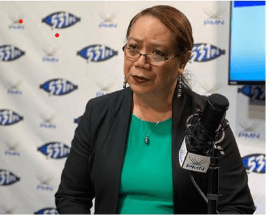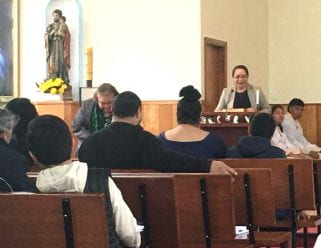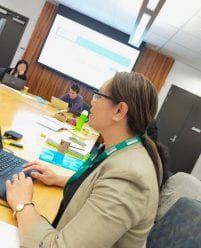A pilot eye health survey and eye exams in East Central Auckland (Orakei, Panmure and Glen Innes) on Maori and Pacific people uncovered significant unmet need among three population groups living in this area.
Telusila Moala-Mafi Vea is the Community Survey Coordinator for the Community Eye Health team. She holds a Master’s in Public Health from Massey University, with a focus on the health of Pacific people. As a Pacific person herself, Telusila plays a key role in the Community Eye Health team by engaging with the community to understand their needs.
Telusila coordinated the Community Eye Pilot Study that took place in 2021. Currently, she spends some of her time interviewing people who participated in the pilot study, so that we can better understand the challenges they face when seeking eye care.
Here, we share some of Telusila’s insights from working with Pacific people in the community.

“I really enjoy working and helping my own people, particularly Pacific and Māori people. Once they know I am of Pasifika heritage, they expressed themselves freely and tend to tell me their problems. This is because they embraced me as one of them.” [Telusila Moala-Mafi Vea]
When we visited the Auckland suburb of Glen Innes to recruit people for our Community Eye Pilot Study, our team relied on Telusila to engage with Pacific people in a way that valued their culture, tradition, and family histories.
“Where they come from is very important. Pacific people’s beliefs are the priority. Pacific people’s second home is church,” she explains.
Rather than approaching people directly at their doorsteps, Telusila’s first step was to build their trust. She met with church leaders in the community, where she explained what the eye survey involved and why it was important to include as many Pacific people as possible. Her own Pacific culture allowed her to develop rapport with the community, and her efforts were well received.

Telusila engaging with church communities during the Community Eye Pilot Study
“Your coordinator came and talked at our church about your program, it was such a blessing. The coordinator explained the process clearly. I was happy that I will have a chance to check my eyes.” [participant in the Community Eye Pilot Study]
As part of her work in the Community Eye Pilot Study, Telusila has spoken to many Pacific people who can’t access the eye care services that they need. Sometimes this is because people find it difficult to get to their optometrist, particularly if
there isn’t one nearby. Most often though, the cost of eye care is what prevents Pacific people from getting their eyes checked.
“Eye examinations and glasses are very expensive, and people cannot afford to meet these costs. When people cannot afford to go to the optometrist, they will go to the $2-dollar shops and purchase those glasses and use them,” explains Telusila.
“Our people cannot afford to visit an optometrist, let alone purchasing the prescribed glasses. Our people do not have the money, but we need to access the optometry and check our eyes regularly as this is very important for our health.” [participant in the Community Eye Pilot Study]
Some projects and services coordinated by the Community Eye Health team—such as the Community Eye Pilot Study—allow people in the community the opportunity to access eye examinations that they may not otherwise be able to afford. Telusila has received positive feedback from many Pacific people who have received free eye care by participating in the Community Eye Pilot Study, and this has changed their lives for the better:
“Now I got my glasses, I am quite confident to go anywhere without asking for help, at home, shopping and church. This is the first time for me to wear glasses. Now I am comfortable to complete forms at the doctor, read my bible at church, and do my shopping.”
“Life is wonderful for me, I am confident now when I have my new glass. It gave me a new life.”
“I never had this opportunity to fully checked my eyes, this is the first time. Participating in this program is the best thing that ever happened to me, as my eyes are so important to me. This makes me feel happy and grateful.” [participants in the Community Eye Pilot Study]

Telusila Vea training Research Assistants in preparation for the Community Eye Pilot Study
So how can we help more people access these types of services? Telusila has observed a need for affordable eye care in New Zealand, such as free or subsidised eye examinations and prescription glasses, particularly services that are located close to Pacific communities. She speaks highly of the Vision Bus Aotearoa, which provides mobile eye care services to people who need them the most. She hopes that this service will one day reach Pacific communities where it can remove the transportation and financial concerns that some people face when seeking eye care.
“Based on what I had experienced with your service, there is a need for this service to made available for our family and community. It is very important that we take care of our eyes and check them regularly. In saying that, costs should be affordable by our people.” [participant in the Community Eye Pilot Study]
Meanwhile, Telusila feels happy that she could be involved in helping people improve their lives. Her work continues, and we hope she can provide a voice for many more Pacific people in the community.
“I only hope the government can subsidised the cost and see the important of eye health care to us and the community. We all deserve a good quality of life, especially constantly checking our eyes. This is a much valuable program and need to continue.” [participant in the Community Eye Pilot Study]
